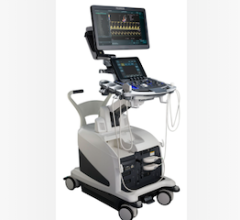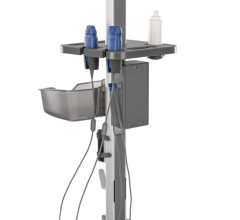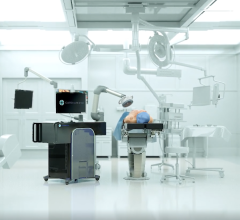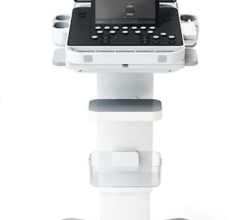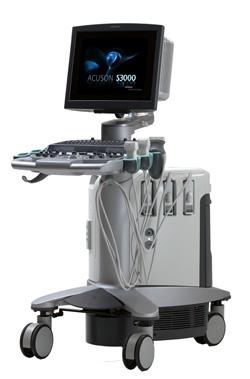
November 28, 2011 – Siemens Healthcare launched the Acuson S3000, its latest ultra-premium ultrasound platform, at the 97th Scientific Assembly and Annual Meeting of the Radiological Society of North America (RSNA), November 27 to December 2 in Chicago. The new system includes advanced automated ultrasound fusion imaging, as well as multi-modality review capabilities to provide additional clinical and spatial information in the analysis of complex pathology and/or when performing interventional procedures such as biopsies. In combination with its comprehensive suite of elastography applications, Siemens highlighted its new strain imaging application Virtual Touch tissue IQ imaging, reinforcing the company’s role as a leader in strain elastography imaging. Also at RSNA 2011, Siemens introduced the latest addition to its family of high-density (HD) transducers: the 8C3 HD transducer, specially designed for obstetrics and pediatric applications.
The new ultra-premium Acuson S3000 ultrasound system advances Siemens’ pioneering ultrasound technologies with its proprietary eSie Fusion imaging, which enables the automatic fusion of 3-D computed tomography (CT) volumes with real-time ultrasound via a single click. Current fusion techniques require time-consuming manual registration of CT or magnetic resonance (MR) images. They also require the patient to lie motionless throughout the entire exam to avoid elaborate manual realignments. The automatic, one-click advanced registration capabilities of the Acuson S3000 system eliminate these limitations, reducing CT image registration to mere seconds, and profoundly simplifying manual registration techniques to enhance workflow during MR volume registration.
“Using the new eSie Fusion imaging technology allows us to significantly speed up our workflow,” said assistant professor Dirk-André Clevert, M.D., section chief of the Interdisciplinary Ultrasound Center at Munich University Hospital Grosshadern, Germany, and one of the first physicians to test eSie Fusion. “Previously, the success of interventions was generally monitored by follow-up CT examinations. However, due to the new ultrasound fusion solution, it should be possible to reduce the number of follow-ups done with CT. The use of fusion provides us with improved clinical information – without additional radiation. This is a great advantage for both the patients and the healthcare provider.” Fusion imaging can play an important role not only in diagnosis and follow-up but also in image-guided interventions.
Increased diagnostic confidence through multimodality review
In addition to fusion imaging, the Acuson S3000 system features multi-modality review capabilities that enable CT and/or MR images to be imported into the ultrasound system for a rapid, easy, side-by-side comparison. These capabilities provide an additional layer of information to further increase diagnostic confidence and confirm therapeutic decisions.
Stiffness map and quantification in one image
Building on its vast experience in ultrasound elastography imaging, Siemens showcased the most comprehensive suite of elastography applications available in the industry. The latest application to confirm Siemens’ leadership in this field is Virtual Touch tissue IQ, which permits the simultaneous display of a color-coded tissue stiffness map and shear wave velocity measurements in a single image. This application allows immediate visual assessment of lesions and their stiffness characteristics while providing simultaneous quantitative evaluation.
Since its introduction in 2005, manual-compression eSie Touch elasticity imaging has been complemented by push-pulse Virtual Touch tissue software applications, Siemens proprietary implementation of acoustic radiation force impulse (ARFI) imaging. Virtual Touch tissue imaging and eSie Touch elasticity imaging create a visual stiffness map (known as an elastogram) via tissue compression. Complementing these two technologies, Virtual Touch tissue quantification³ additionally measures the propagation speed of shear waves to offer the first and only quantitative assessment of increased tissue stiffness – a frequent sign of pathology.
HD transducer technology – More accurate information in every clinical image
Siemens’ most recent proprietary high-density (HD) ultrasound transducer technology ensures the best possible information for the creation of every clinical image. Unlike conventional ultrasound transducer technologies, HD technology employs high-density ultrasound elements that deliver greater signal fidelity, improving image compounding and providing the basis for noise- and clutter-free images with a high degree of contrast resolution and clear tissue differentiation.
Siemens’ new 8C3 HD ultrasound probe was designed primarily for obstetric and pediatric applications, permitting high-resolution imaging in a wide range of exams. The transducer features a small footprint for improved surface contact and enhanced scanning performance. A 50 percent larger field-of-view (FoV) enables the display of a full third-trimester fetal head, improving measurements and anatomic visualization. The range of ultrasound transducers enabled on the Acuson S3000 system also includes the recently introduced 6C1 HD high-density ultrasound probe for radiology, gynecology and obstetrics, as well as the 18L6 HD probe for superb imaging in small parts, including the breast and thyroid.
Preparing for a changing healthcare market
Siemens Healthcare recently launched Agenda 2013, a global initiative to prepare for the changing healthcare market. It defines four fields of action – innovation, competitiveness, regional footprint, and people development – with specific measures to be implemented over the next two years. As part of this new initiative, the Siemens Ultrasound Business Unit further extend its innovative portfolio with products that demonstrate how ultrasound solutions help manage the cost pressures in healthcare without sacrificing excellence in patient care.
For more information: www.siemenshealthcare.com


 October 09, 2025
October 09, 2025 


